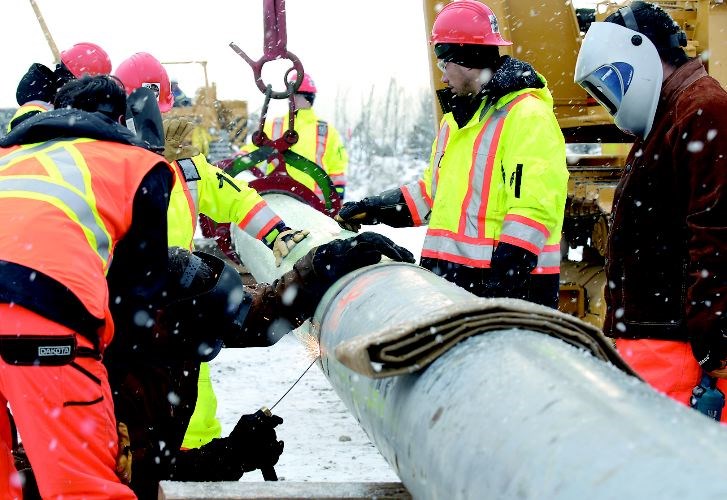A pipeline is under construction across the local landscape, only a few minutes' drive off of the Blackwater Road.
There is nothing in the pipe. It isn't connected to anything and it goes nowhere. The people building the pipeline are a set of students learning the trade by performing almost every practical duty of the real jobsite. They plan to flow into a burgeoning industry with many possible projects proposed for the region over the next several years, even if you don't include the contentious Enbridge oil vein from Alberta.
It is the first pipelining course run by O'Brien Training and as far as the partners involved can find, it is the only one in Canada. The inaugural class of 15 are a packaged group from the Pacific Trail Pipelines Aboriginal Skills Employment Partnership (PTP ASEP). This agency received funding from the federal government to educate members of the 15 First Nations affected by the Pacific Trail Pipeline and Kitimat Liquified Natural Gas projects.
"Aboriginal labour force participation is paramount to ensuring that regional economic development, and more specifically, commercial LNG development occurs and Aboriginal communities are included and benefit," said agency executive director Diane Collins. "Pipelining is not a career that's common in most of B.C., you don't see this everyday in other regions, just on this route [roughly Prince George to Prince Rupert). We have a lot of interest among the First Nations communities along the route to work in that industry, the companies involved need a skilled labour force, so it is a great fit to work together. We can fill that gap."
O'Brien Training owner Dan O'Brien said that, as a private education facility, he had the agility to simply build the course when he heard there was a need. The PTP ASEP officials told him what education needs had to be met for the students, he consulted with industry to know what credentials would be valuable in a graduate, then he set about collecting the materials and instructors necessary to satisfy both sides.
The added advantage was a large rural wilderness campus O'Brien owns where the students can literally build a pipeline about 600 metres long, using all the associated specialty tools, and simulating common pipeline scenarios like going under an obstacle like a road.
"We are really exposing these students to a whole industry," O'Brien said. "Instead of just teaching the student how to drive one piece of heavy equipment, or getting certified for a particular skill, this is the entire industry of pipelining. That also means, they get a lot of transferable skills for other sectors too, so they aren't limited to just pipeline work in the future."
According to O'Brien, pipelining is about 30 per cent special equipment and 70 per cent basic labour. The course teaches both. When snow was blowing sideways on Friday, and rain showers dropped on Tuesday, the students had to lace up the boots and cinch up the visi-vests and go out onto the job site and carry out their shift just like a regular work day on a real pipeline. Each day has about two hours of classroom time and six hours of on-the-job labour, rotating through all the different duties they will experience in the actual industry. Each course is 10 days.
Once the pipe is laid to industry standards, O'Brien staff will dig it up, cut it back to its original pieces, and the next class will start from the beginning.



